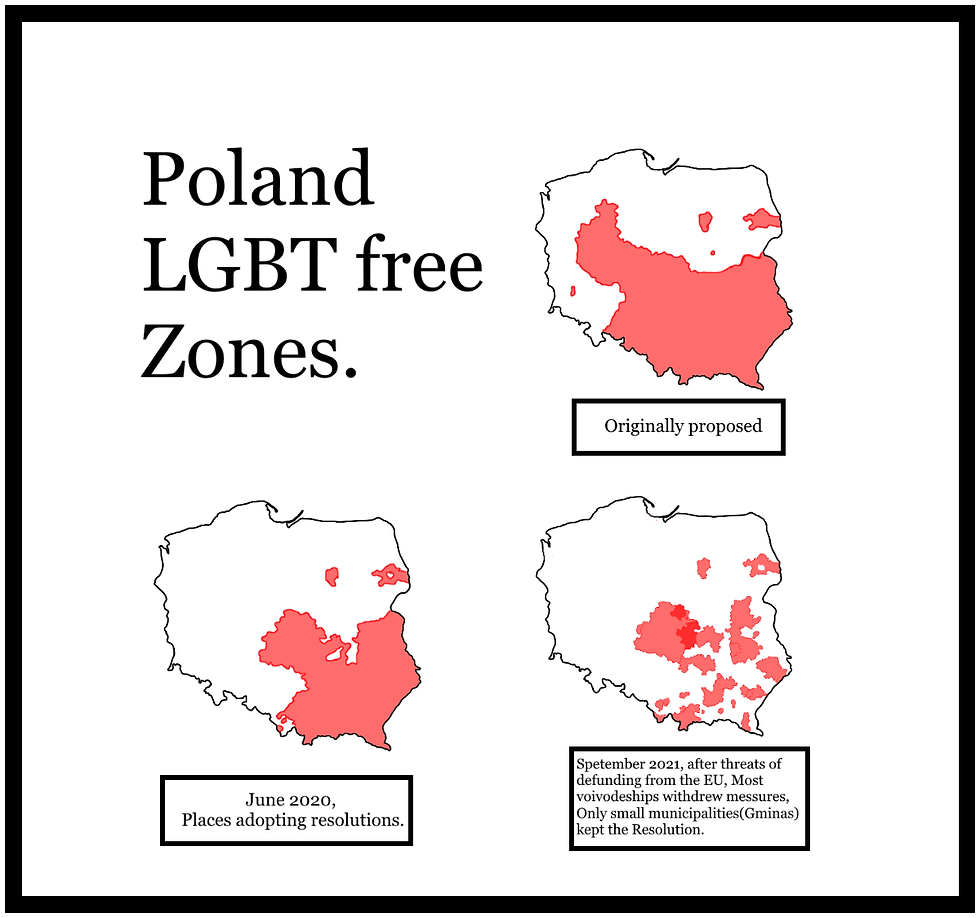Poland Removes Its Last ‘LGBT-Free’ Zone: A Moment of Hope and a Mirror to Our Fears
- Sonal Giani
- May 1, 2025
- 2 min read

Last week, something monumental happened in Poland—though it may not have made it to every headline. The town of Łańcut quietly voted to revoke its resolution declaring itself “free from LGBT ideology.” And with that, the last remaining “LGBT-free zone” in Poland was abolished.
It’s a victory—but not just a symbolic one.
Between 2019 and 2020, nearly 100 municipalities across Poland adopted these declarations. Framed as a stand against so-called “LGBT ideology,” these zones weren’t enforced by law. Yet they sent an unmistakable message: LGBTQ+ people were not welcome here. Pride flags were torn down. Queer events were cancelled. Activists were harassed. And young LGBTQ+ people—especially in rural areas—were left feeling isolated and invisible.
These zones weren’t just about politics. They became tools of cultural fear—rooted in misinformation, stoked by far-right narratives, and weaponized during election seasons. They told people that queerness was something foreign, dangerous, and incompatible with traditional values.

But what’s remarkable is how this tide has turned.
Since the defeat of Poland’s ultra-conservative Law and Justice (PiS) party in 2023, we’ve seen a slow but steady reversal. Local councils began repealing these resolutions—some in response to pressure from the European Union, which threatened to cut funding to discriminatory regions. But others did it because of ongoing advocacy by Polish LGBTQ+ groups and allies who never stopped fighting, even in the hardest times.
So yes—this is a story of hope.
But it’s also a reminder of how quickly a society can normalize exclusion when fear goes unchallenged. And how patient, and persistent the work of undoing that exclusion must be.
It’s easy to dismiss these zones as something uniquely Polish or Eastern European. But versions of this exist everywhere—through bathroom bans, transphobic media narratives, anti-LGBTQ+ rhetoric wrapped in “parental rights,” or even in workplaces that ask queer employees to "tone it down." So as Poland closes this painful chapter, it’s not just a moment to celebrate—it’s a moment to pause and ask ourselves: what does it take to undo harm that was made visible by law but reinforced every day in people’s lives?
The truth is, the repeal of these zones doesn’t erase the fear they sowed or the silence they demanded. But it does send a powerful message: that the tide can shift. That people can change their minds. That advocacy works—even when it’s slow, exhausting, and often invisible.
For queer communities across the world, especially those living under governments that refuse to recognize them—this is a reminder that the world is watching, and sometimes, the arc does bend. Not on its own, but because people demand it to.
Let’s hold space for those who fought and those still fighting. Let’s talk to people who are unsure or afraid. And let’s keep building a world where dignity isn’t something you have to campaign for—it’s something you’re simply given.
Not just in Poland. Everywhere.



Comments